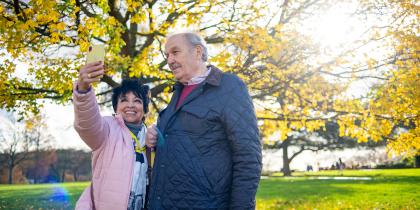Travel Tips for Seniors
Travel supports active, successful aging, but there are a few things you need to know.

Say the word “travel” and what comes to mind–jetting off to some exotic location, a cross-country road trip, or an all-inclusive cruise to the Caribbean?
Some people are born with wanderlust in their DNA, while others are just fine being homebodies. If you’re an adventurer who craves exploring new places, keep it up. But even if you prefer to stay within your comfort zone, you should consider including some form of travel in your life. Here’s why.
Benefits of Travel for Older Adults
Although most people consider travel a leisure activity, research confirms that it offers potential health benefits. A 2022 study published in the International Journal of Environmental Research and Public Health shows that travel can play a significant role in active, successful aging, as well as contribute to an overall sense of well-being. The study discussed the value of travel for maintaining or improving physical and mental health, arguing that travel can:
- Provide learning opportunities that support intellectual development and preserve cognition.
- Lift spirits through companionship, the opportunity for escape from routine, and via reminiscence.
- Improve physical health--some people report that chronic conditions such as arthritis and asthma improve with travel. At the very least, getting out of the house demands physical activity, helping maintain mobility and independence.
Tips to Stay Healthy
As with much in life, travel is not without risks. But don’t let that stop you. There are steps you can take to optimize the rewards and minimize mishaps. Chief among things you should consider before you pack your bags is knowing what to do to protect your health:
- Many older adults live with chronic illness. Studies indicate a change in environment might derail established coping mechanisms, so consult with your physician to assess any risk your condition may pose.
- Check that vaccinations are up to date and if others are required for your destination.
- Carry medications on your person and consider logistics involved with transporting medical equipment.
- Have a plan in case you need medical treatment while away from home.
- Follow public health guidance. The Centers for Disease Control still recommends that travelers wear masks on public transportation. Adults older than 65, but particularly those with chronic conditions and/or who are immunocompromised, are vulnerable to infections, including COVID-19.
How to Choose Accommodations
If you have limited mobility, where you stay while away should meet certain safety criteria. Older hotels, those off the beaten track, or places booked through platforms such as Airbnb may fall short. Ask yourself:
- If applicable to you, is the accommodation wheelchair accessible?
- Is there an elevator?
- Are there hazards that may lead to falls, including stairs, uneven floors, poor lighting, and bathrooms that don’t meet safety standards for older adults or individuals with disability?
- Is the facility secure with on-site staff to provide resources or help solve problems that may arise?
- Is someone available to help with luggage or will you be on your own?
- Is there easy access to transportation or sites of interest?
What to Consider When Flying
Even the most seasoned traveler can find air travel stressful these days. To ease the burden air travel may cause:
- Pack medical devices and medications in a carry-on, and check Transportation Security Administration rules ahead of time for up-to-date rules.
- If you’re 75 or older, TSA might let you go through security in the pre-check line, which means you don’t need to remove your shoes or check liquid medicines.
- Busy airports and tight spaces on airplanes can be a fall risk. The airline will help if you call ahead and ask about priority boarding.
- Plane cabins typically have low humidity, which poses a risk of dehydration and respiratory diseases, so be sure to drink lots of water. Often older people don’t detect thirst until they become dangerously dehydrated.
- On long flights, be sure to walk in the aisle to prevent blood clots, particularly if you’re at high risk. That includes people who've had surgeries or recent hospitalizations, cancer, or have a family history of blood clots.
- Schedule downtime once you get to your destination to rest before engaging with your itinerary.
Advice from Seasoned Travelers
So you’re convinced that it’s time to take a trip. What now?
A vibrant cohort of intrepid travelers call Hebrew SeniorLife’s senior living communities, including Orchard Cove in Canton and NewBridge on the Charles in Dedham, home when they’re not on the road. Their stories validate much of the expert advice and offer a nuanced perspective that only lived experience provides. They share how they plan and negotiate travel to ensure it meets their goals and fits their lifestyles.
Debbie and Harvey Sherman have lived at Orchard Cove for 30 years and traveled abroad into their early 90s until the pandemic forced a hiatus. Debbie lives with chronic illness, including vertigo and osteoporosis, but has never let it stop them from getting away to experience diverse cultures and people.
Debbie avoids group tours because they make her feel old, and because her limited mobility sometimes makes it difficult to keep up. She prefers finding a safe place to set up a “home base” that allows her to visit sites of interest at her own pace and on her own terms. “What we generally did was rent homes or apartments in the cities or regions we wanted to explore,” says Debbie.
There are reputable companies that not only maintain a roster of houses or apartments almost everywhere you would want to go, but also offer services to meet the needs of individuals with disabilities. Debbie explains, “They meet you at the airport, pick up your luggage, get you situated and then provide a contact to call if you need help or a problem solved. . . . On a trip to Morocco, I booked a car and driver through an agency. The agency devised an itinerary that I could negotiate with a walker.”
Debbie may be unusually intrepid, but she says she has never felt vulnerable as an older traveler. And even though she has had to seek medical attention in various countries, she reports nothing but positive experiences.
Around the World or Around the Block
Eileen Schwarz, also of Orchard Cove, loves the diversity of landscape, culture, and people she encounters while traveling. The benefits that she describes can apply to wherever your journey takes you--around the world or around the block.
“I love the stimulation of getting out into the community and meeting people of all ages. A new environment can provide a new perspective on life. Not seeing the same thing every day is good for your brain,” says Eileen.
Eileen has always loved nature and, as a psychologist, she strongly promotes the value of getting outside. Particularly during the pandemic lockdown, trips she took by foot to local parks connected her to the outside world and provided social contact as she met friends for walks.
Though she’s a free spirit, Eileen has changed one thing as she's gotten older. “Ideally, I would like to travel with a companion both for the company and as a security blanket,” she says. “And, it’s nice to see new things, but I’m one who likes to share impressions with others. So, my first choice would be to travel with another person, and second would be with an organized trip.”
Free from the Cares of Home Ownership
NewBridge residents Benita and Mike Ross can be described as nothing short of globetrotters. They’ve literally traveled around the world from Manitoba to see the polar bears, to Japan, New Zealand, Patagonia, the Amazon, Nepal, Bhutan, and most recently Morocco.
Benita points out how living at NewBridge supports their travel aspirations. “We were relatively young when we moved to NewBridge. We moved here with the notion that if you live in a house with property to take care of, it’s difficult to just pick up and go. It isn’t here--we close the door, tell property managers that we’re going away, and we’re off. It’s a liberating place to live in many ways.”
Although their travel interests run toward places less traveled, Mike says, “We’re not ones to strap on backpacks and set out on our own. Our preferred mode of travel is with a small group, and we book through a company that arranges accommodations and guides.”
Benita adds, “There are places where you’re at a tremendous disadvantage if you’re not under some group umbrella. We’re careful travelers. We’ve been to India, which was wonderful, but it’s an example of a place where there are a lot of logistical issues that would be difficult to negotiate on your own.”
Benita and Mike also appreciate the social aspects of travel. “Lately we’ve taken to traveling with another couple that we met on an Antarctica trip,” says Benita. “We traveled together in Morocco, and we rented a car and driver together, which allowed us to explore from a different perspective.”
Get Out and Go!
Finally, Benita offers one big tip--“Do it while you can. Our NewBridge neighbors who are no longer able to travel often say how they wish they’d done what we do. We have one of those wall maps of the world and have stuck pins where we’ve traveled. There are a lot, but not enough. At the bottom of the map is a line that reads, travel leaves you speechless, and makes you into a storyteller.”
Looking for a Lifestyle That Supports Flexibility?
If you’re ready to move to a community that offers worry-free living so you can travel without being concerned about what’s happening at home, Orchard Cove in Canton or NewBridge on the Charles in Dedham might be the right choice for you. Both communities offer independent senior living, including a variety of apartment styles. And when you’re not traveling the world, you can take advantage of a rich calendar of life-long learning activities, cultural events, and fitness and wellness services. Interested in a tour? Contact us today.




